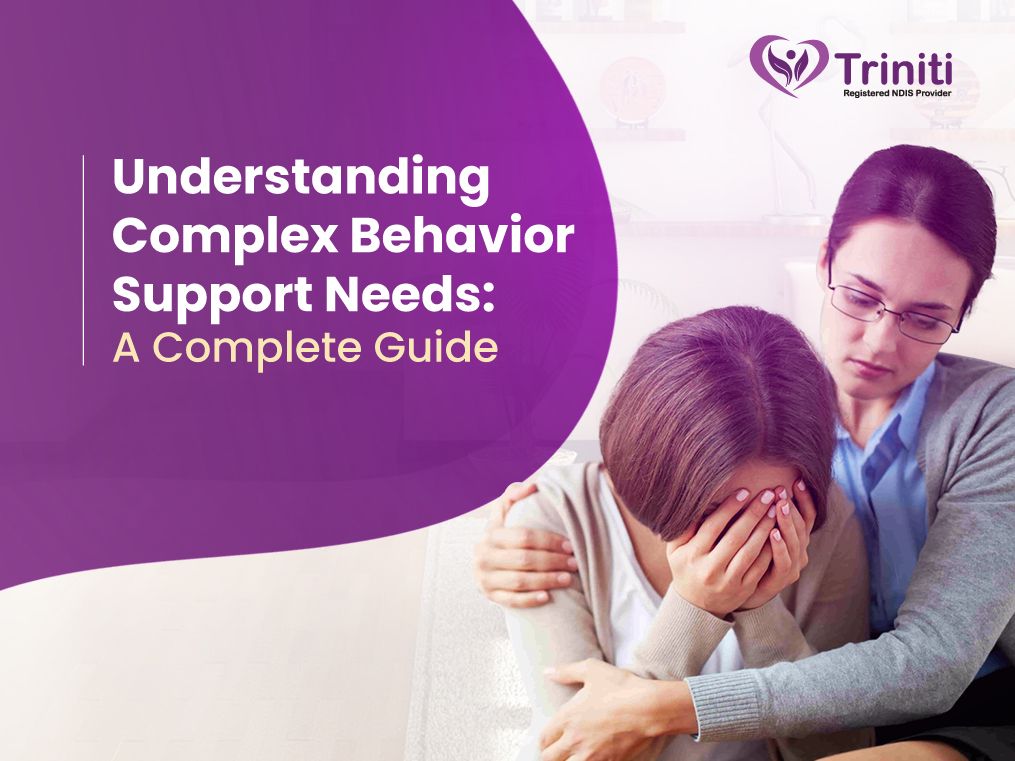+ News and Articles +
Understanding Complex Behaviour Support Needs: A Complete Guide
02 Jun 2025 by Shine Jose
It can be difficult and emotionally draining to support individuals with disabilities, particularly when there are concerning behaviours. At Triniti Care, we recognize that meeting complex behaviour support needs calls for empathy, expertise, and individual-appropriate tactics. The purpose of this guide is to explain complex behaviours, their causes, and how receiving the right kind of support can help bring about constructive change.
What Are Complex Behavior Support Needs?
A person is deemed to have complex behavioural support needs when they exhibit behaviours that are challenging to control, detrimental to themselves or others, or destructive to their surroundings. These behaviours can range from self-harm to verbal abuse, property damage, withdrawal, and aggression.
Such actions are not arbitrary; rather, they are a form of communication. The person frequently tries to express pain, unfulfilled needs, fear, frustration, or distress. Effective support should begin with acknowledging this.
Who Might Experience Complex Behaviour Support Needs?
The behaviour of concern can be experienced by anyone but is more likely to be exhibited by a person with;
- Intellectual or developmental disabilities.
- Autism spectrum disorder.
- Mental health conditions.
- Acquired brain injuries.
- Communication difficulties.
- History of trauma/neglect.
Things get complicated when these factors interact- for example, an environmental trigger, emotional regulation issues, and a limited support network.
What Causes These Actions?
It's critical to comprehend the motivations behind behaviour. Typical triggers consist of:
- Sensory overload, such as in crowded areas or loud noises.
- Pain or discomfort resulting from untreated health conditions.
- Routine changes can make people anxious because they are unpredictable.
- Unmet communication needs occur when someone is unable to communicate their feelings or desires.
- Reactive or defensive behaviour brought on by past trauma.
The person and those around them may experience distress if these triggers are not recognized or controlled.
The Importance of PBS
To change complex behaviors, Positive Behaviour Support (PBS) is an effective person-centered approach. Rather than punishing the behavior, PBS:
- Identify the reasons for behaviours.
- Develop new skills to replace challenging behaviors.
- Make changes to the environment that reduce triggering.
- Increase quality of life and choice.
An individual with a behavioral disorder is assisted by PBS professionals who work with their family, paid workers, allied health providers, and behaviour support professionals.
What is a Behaviour Support Plan (BSP)?
A Behaviour Support Plan is an individualized plan that provides information about the strategies and supports in place to help a person with behaviours in a safe and pro-social way. A BSP is developed after a comprehensive functional behaviour assessment and includes:
- An explanation of the individual's actions.
- Recognized risk factors and triggers.
- Techniques for prevention.
- Activities that develop skills.
- Safe and suitable reactions to actions.
- Team Duties.
At Triniti Care, we make sure BSPs are ethical, realistic, and updated frequently to accommodate the person's changing needs.
What Is the NDIS's Function in Complex Behaviour Support?
Under the NDIS, individuals with complex behaviour support requirements may receive funding for
- Specialist Behaviour Support Services.
- Implementing Behaviour Support Plans.
- Training for support workers/family carers.
- Therapeutic supports (e.g., psychology, occupational therapy).
- Crisis management and intervention.
If restrictive behaviours are involved—physical restraint, seclusion, chemical restraint—NDIS requires providers to adhere to stringent guidelines, ensure accountability, and work towards minimizing and eliminating sustained restrictive practices over time.
Triniti Care’s Approach to Complex Behaviour Support
At Triniti Care, we are committed to providing support for people with complex needs safely and respectfully, whilst ensuring that people remain empowered. Our team:
- Conducts comprehensive assessments to understand the individual.
- Work closely with families and carers to create workable BSPs.
- Provides training for support workers to ensure support is delivered consistently and safely.
- Builds trust and relationships.
- Utilizes non-restrictive strategies whenever possible.
We believe that every person should be understood, not judged and that people should be supported to live a life of dignity, purpose, and choice.
Connect With Us Now
Understanding and supporting complex behavior needs can be quite a challenge! It requires professional knowledge, empathy, and collaboration. With the right support, people with complex behaviours can flourish within inclusive and nurturing settings. Connect with us now!
tes



